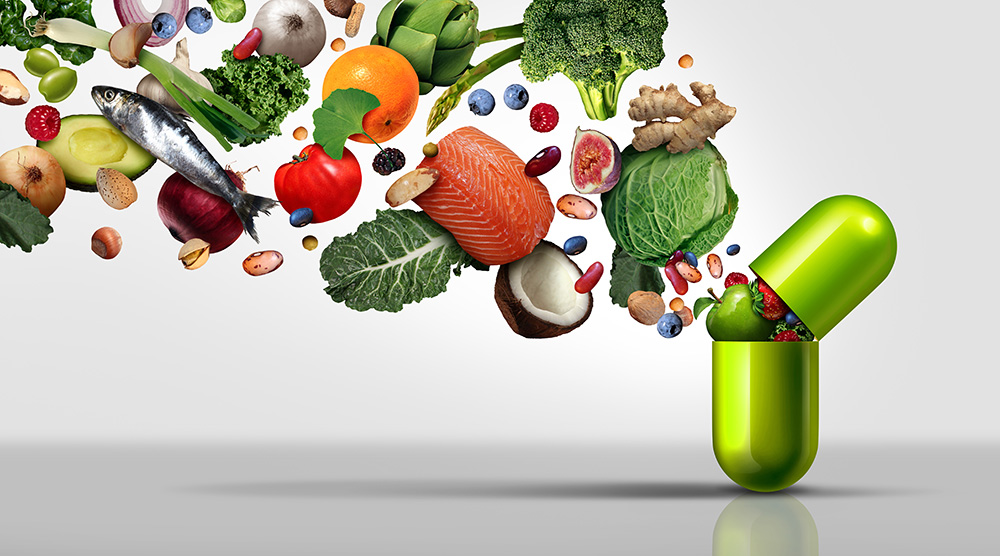Nutrition Supplementation
What is Nutritional Supplementation?
Tablets, powders, capsules, drinks, and energy bars; nutrition supplements come in a variety of forms. These days, nutrition supplements are readily available, and can be found almost everywhere we shop, including pharmacies, grocery stores and health food stores. Furthermore, we are surrounded by advertisements which encourage us to take a wide variety of supplements to stay healthy. According to Statistics Canada, in 2015 over 45% of Canadian’s reported consuming at least one nutrition supplement daily. However, the question remains: do we really need to take a nutrition supplement to maintain our health?
Benefits of the Nutritional Supplementation:
Our bodies require a variety of nutrients, as each nutrient plays an important role in optimizing our health. The great thing about getting our nutrient needs through food is that many heathy foods, for example fish and vegetables are high in a wide variety of vitamins and minerals! It is important to include an assortment of foods in our diet to ensure that we are meeting our needs. For most vitamins, it is possible and achievable to meet 100% of our needs orally (with the exception being folate for women and vitamin D for those over 50).
Certain groups such as athletes, women who are pregnant or lactating, those who are vegetarian or vegan, and individuals who are anemic or severely deficient in a specific nutrient may require additional vitamin and mineral supplementation.
If you are eating a balanced diet, you likely do not require a multivitamin supplement. Some multivitamins, especially ones that require you to take more than one tablet per day, may cause you to consume too much of some nutrients. Some vitamins and minerals, such as vitamin A, can have dangerous consequences if consumed in excess. A multivitamin cannot take the place of eating a variety of healthy foods. Foods provide more than just vitamins and minerals; they contain other healthy elements such as fibre which have added health benefits. However, for people who don’t get enough vitamins and minerals from food alone, have a poor appetite, or avoid certain food groups, a multivitamin may be beneficial.
If you have concerns that you may not be meeting your individual requirements, speak to your medical doctor and pharmacist before beginning any nutritional supplements, as they may interact with other medications you are taking and can be dangerous in high amounts.
Challenges Associated with the Spoken Menu:
Check out the chart below which displays the dietary requirements and food sources of 8 common nutrients.
| Nutrient | Requirements | Common Sources |
| Vitamin B12 | Adults over 18 years of age require 2.4 mcg/d *Health Canada recommends adults over 50 consume foods fortified with vitamin B12 or take a supplement | Beef liver Clams Fish Poultry Eggs Milk Foods fortified with Vitamin B12 such as breakfast cereals |
| Calcium | Men and women age 19 – 5 require 1000 mg/dMen age 51 – 70 require 1000 mg/dWomen age 51 – 70 require 1200 mg/d | Milk Yogurt Cheese Kale Broccoli Chinese cabbage Salmon and canned sardines with bones Calcium fortified foods such as breakfast cereal, soy and rice beverages, tofu. |
| Vitamin C | Adult men require 90 mg/dAdult women require 75 mg/d If you smoke, you require an additional 35 mg of vitamin C, in addition to your daily recommended needs. | Citrus fruits Bell peppers Kiwi Broccoli Strawberries Cantaloupe Potatoes Tomatoes |
| Vitamin D | Men and women 19 – 70 years old need 600 IU/d or 15 mcg/dMen and women 71 years and older need 800 IU/d or 20 mcg/d *Health Canada recommends that everyone over the age of 50 take a Vitamin D supplement of 400 IU each day. | Flesh of fatty fish (salmon, tuna, mackerel) Cheese Egg yolks Vitamin D fortified items such as milk, breakfast cereals, orange juice, yogurt, margarine, soy beverages. *We also we get vitamin D from the sun, however it is best to limit sun exposure to decrease the risk of skin cancer. |
| Folate | Adults over 19 years old require 400 mcg/d *Health Canada recommends that females who are of child bearing age consume a 400 mcg supplement of folic acid daily. | Asparagus Brussel sprouts Nuts Beans Oranges Peas Dark green leafy vegetables Items fortified with folate such as bread, cereal, bagels, rice and pasta |
| Iron | Men ages 19 – 51 require 8 mg/dWomen ages 19 -51 require 18 m/dMen and women over 51 years of age require 8 mg/d | Oysters Chicken Beef Seafood Eggs Tofu Potatoes Chocolate Nuts Beans Fortified grain products such as breakfast cereals, flour, bread, rice |
| Omega 3s | Adult men need 1.6 grams of ALA (alpha-linolenic acid) per dayAdult women need 1.1 grams of ALA per day | Flaxseed oil Canola oil Walnut oil Nuts Seeds Fish |
| Zinc | Men over 19 years of age require 11 mg/dWomen over 19 years of age require 8 mg/d | Oysters Poultry Beef Nuts Beans Whole Grains Crab Lobster Foods fortified with zinc such as breakfast cereals and dairy products |

